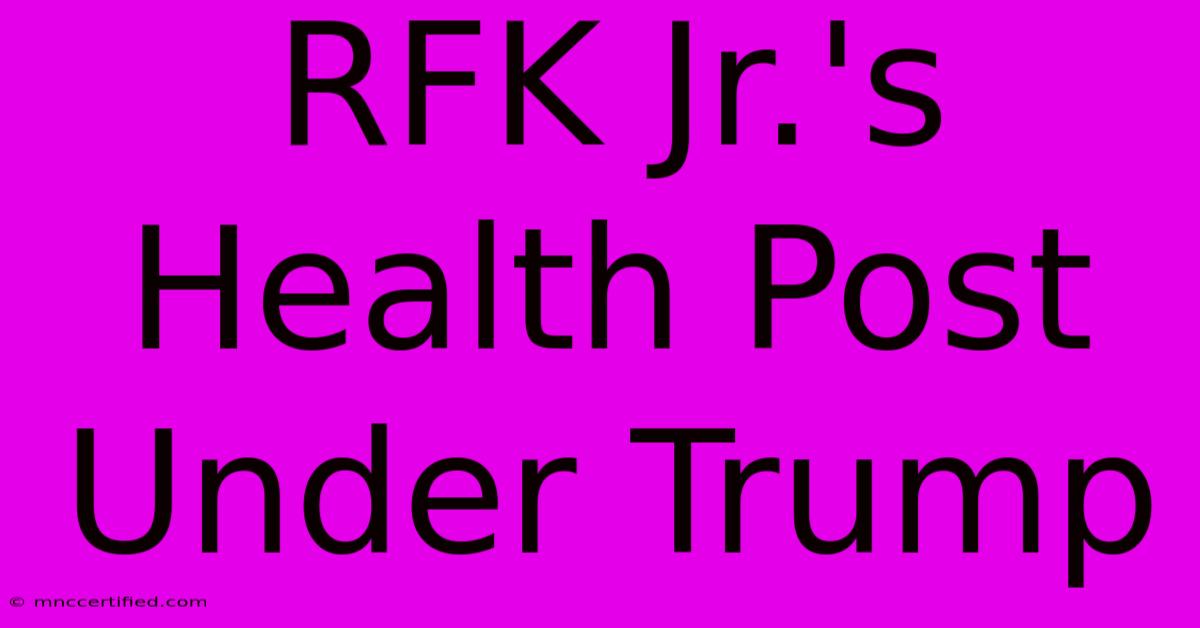RFK Jr.'s Health Post Under Trump

Table of Contents
RFK Jr.'s Health Post Under Trump: A Look Back at a Controversial Appointment
Robert F. Kennedy Jr., the nephew of former President John F. Kennedy and son of Senator Robert F. Kennedy, is a controversial figure known for his outspoken views on environmental and health issues. During the Trump administration, he held a prominent position at the Environmental Protection Agency (EPA), a move that sparked significant debate. This article explores RFK Jr.'s role at the EPA under Trump, examining the controversies surrounding his appointment and the impact it had on environmental policy.
RFK Jr.'s Appointment and His Role at the EPA
In 2017, President Trump appointed RFK Jr. to head the EPA's "White House Environmental Council", a newly created advisory group focusing on environmental regulations and policy. This appointment was met with mixed reactions. While some hailed it as a positive step towards a more balanced approach to environmental policy, others expressed concerns about his controversial views and potential conflicts of interest.
RFK Jr. is known for his advocacy on vaccine skepticism, a position often considered scientifically unfounded. This skepticism, coupled with his views on environmental issues, raised questions about his suitability for a position at the EPA. Critics argued that his appointment signaled a shift towards a more industry-friendly approach to environmental regulations.
Key Controversies Surrounding RFK Jr.'s Appointment
1. Vaccine Skepticism: RFK Jr.'s long-held beliefs on vaccines, including promoting the debunked link between vaccines and autism, drew strong criticism from the scientific community. Many argued that his stance on this issue contradicted the EPA's mission to protect public health.
2. Conflicts of Interest: RFK Jr. had been involved in various environmental advocacy groups, raising questions about potential conflicts of interest in his role at the EPA. Some critics alleged that his appointment was influenced by his connections within the industry and not solely based on merit.
3. Impact on Environmental Policy: RFK Jr.'s influence within the EPA, while limited, was a source of concern for environmental advocates. Some feared that his appointment would lead to a weakening of environmental regulations, potentially endangering public health and the environment.
RFK Jr.'s Departure and Its Aftermath
RFK Jr. resigned from the EPA in 2017, citing personal reasons. His departure did not resolve the concerns surrounding his appointment, leaving a lasting impact on the debate around environmental policy.
His tenure at the EPA served as a reminder of the importance of choosing qualified and unbiased individuals for key positions within government agencies. The appointment also highlighted the crucial role of public scrutiny and accountability in safeguarding public health and the environment.
The Continuing Debate
The controversies surrounding RFK Jr.'s appointment to the EPA continue to resonate today. The debate over vaccine skepticism, environmental policy, and the role of science in government decision-making remain relevant issues. As we move forward, it's important to engage in open and informed discussions about these crucial topics, ensuring that policy decisions are based on evidence and not influenced by personal agendas or ideological biases.
Keywords: RFK Jr., Environmental Protection Agency, EPA, Trump administration, White House Environmental Council, vaccine skepticism, environmental policy, conflicts of interest, public health, science, government, policy decisions, environmental regulations, controversy.

Thank you for visiting our website wich cover about RFK Jr.'s Health Post Under Trump. We hope the information provided has been useful to you. Feel free to contact us if you have any questions or need further assistance. See you next time and dont miss to bookmark.
Featured Posts
-
Venezuela Holds Brazil To 1 1 Draw In Wcq
Nov 15, 2024
-
Watch Greece Vs Spain Uefa Nations League Live
Nov 15, 2024
-
General Electric Insurance Company
Nov 15, 2024
-
Concacaf Nations League Usa Vs Jamaica Matchup 2024
Nov 15, 2024
-
Better Biopic Trailer Robbie Williams As Cgi Monkey
Nov 15, 2024